The world after Oct. 7, and before Trump 2.0: The essential Jewish conversations of 2024
In a tumultuous year, JTA essayists struggled with the trauma of the Israel-Hamas war and the impact of a polarizing election

(Richard Drury/Getty Images)
The trauma of Oct. 7 and the war that has raged since dominated the thoughts of Jewish opinion writers in 2024, and the essays JTA published in its Ideas section. Most of these essays asked more questions than they provided answers: How do we celebrate joyous Jewish holidays amidst tragedy? Why were Jews abandoned by their putative allies? And can a community deeply polarized over a contentious election ever bridge its own divides?
Rereading these essays at the end of a year, it’s clear that we entered into a conversation that few thought would last this long, and which only shows signs of becoming more intense as the full reckoning with the war takes place. But like all conversations entered with good faith, they also provide comfort that Jews can discuss contentious ideas with civility and humility.
Campus turmoil
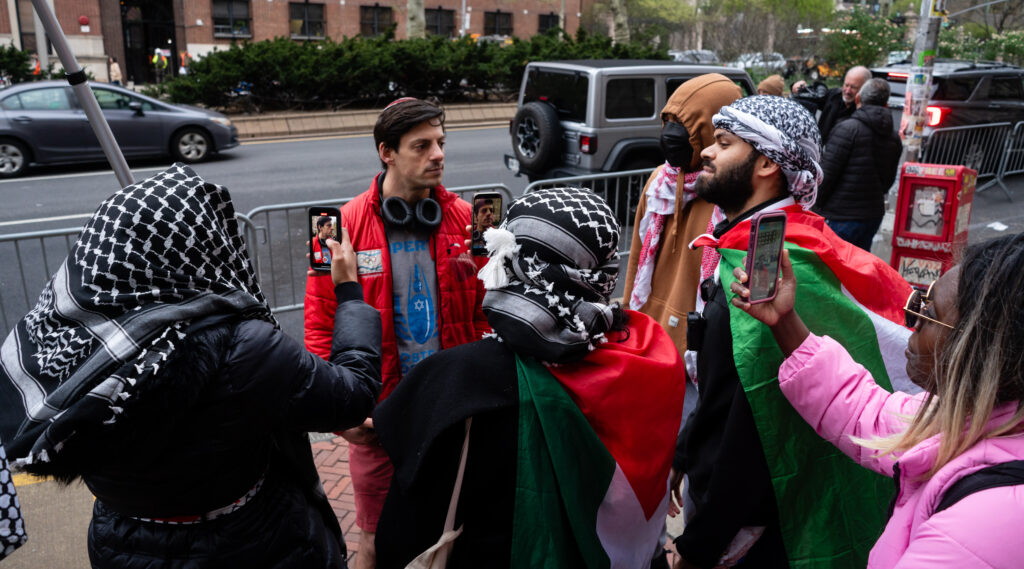
Pro-Palestinian demonstrators surround a Jewish man at a protest outside Columbia University, in Manhattan, April 18, 2024. (Luke Tress)
Our most-read Ideas essay of the year, “An open letter to the Columbia University Gaza war protesters from a pro-Palestinian activist in Israel,” by Haviva Ner-David, was a plea to protesters from an Israeli leftist to embrace the complexities of the war in Gaza and learn from the Jews and Palestinians who have long fought for coexistence. In ”Sensationalizing campus antisemitism isn’t serving Jewish students like mine,” Rutgers University scholar Michael Raucher questioned the tactics of organizations fighting campus activism and showed how students themselves are often best equipped for turning down the heat on conflict.
Jews and their allies
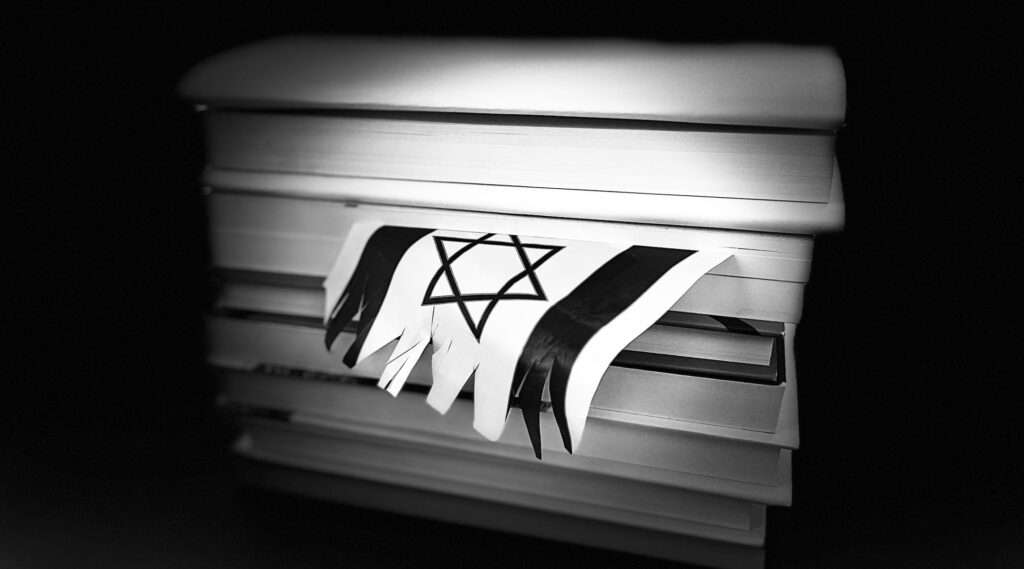
Many Jews in the literary world complained of a climate of intolerance in which authors who are perceived to be pro-Israel are facing exclusion and harassment.(JTA illustration)
Jews, especially those on the left, felt abandoned after Oct. 7, when former allies embraced the Palestinian cause and placed the blame for the conflict solely on Israel. In “Literature celebrates nuance. So why does the book world feel so one-sided on Israel?” writer Erika Dreifus wrote of the petitions being passed around by authors and publishers condemning Israel and ostracizing authors for being “Zionists.” Idit Klein, a leader of the Jewish group Keshet, saw a similar trend among LGBTQ allies who signed one-sided petitions condemning Israel. In her essay, “Made to feel unwelcome at Pride, LGBTQ Jews will not cede joy,” she urged fellow Jewish activists to continue to show up in queer spaces and “be their full selves.” And in “What I learned when a Brooklyn bookstore canceled a discussion of Judaism over my Zionism,” Rabbi Andy Bachman wrote about being told that his presumed support for Israel was enough to disqualify him from moderating a discussion in Brooklyn with a left-wing Jewish author.
Celebration amidst tragedy
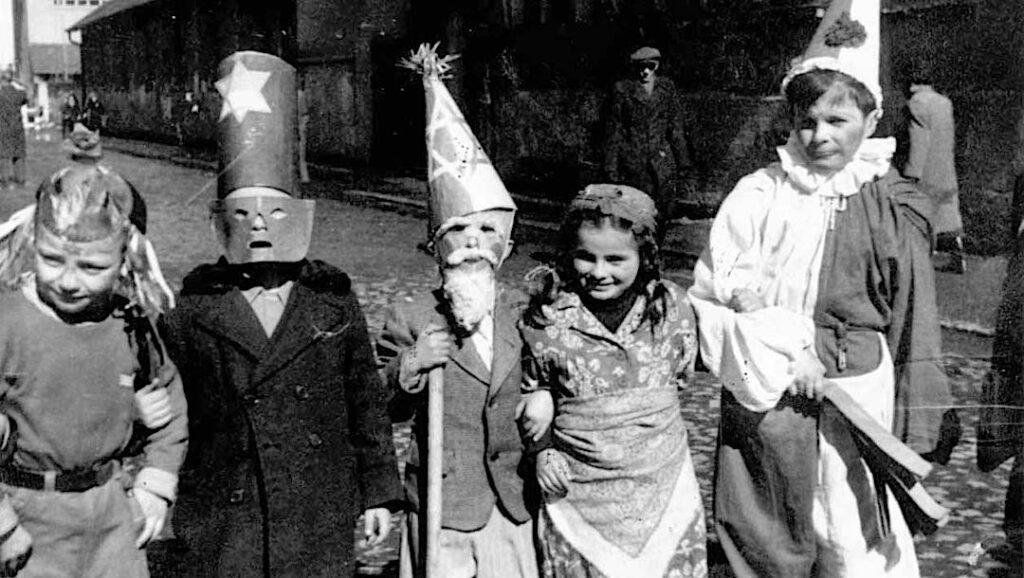
Children in costume for the Purim holiday at the Landsberg DP camp, Germany, after World War II.
(Yad Vashem Photo Archive)
“How do we celebrate Purim in a time of mourning? We’re not the first Jews to face that question,” the Israeli-American educator David I. Bernstein asked in the first of a number of essays on the Jewish calendar in a year of war. Rabbi Mikie Goldstein asked a similar question in “How can I celebrate Israel’s Independence Day when my country is in turmoil?” — concluding that the only way forward is to fight for “a bright future in which we can ensure that our children live in peace, within secure boundaries, with opportunities to broaden their horizons.”
Grieving families
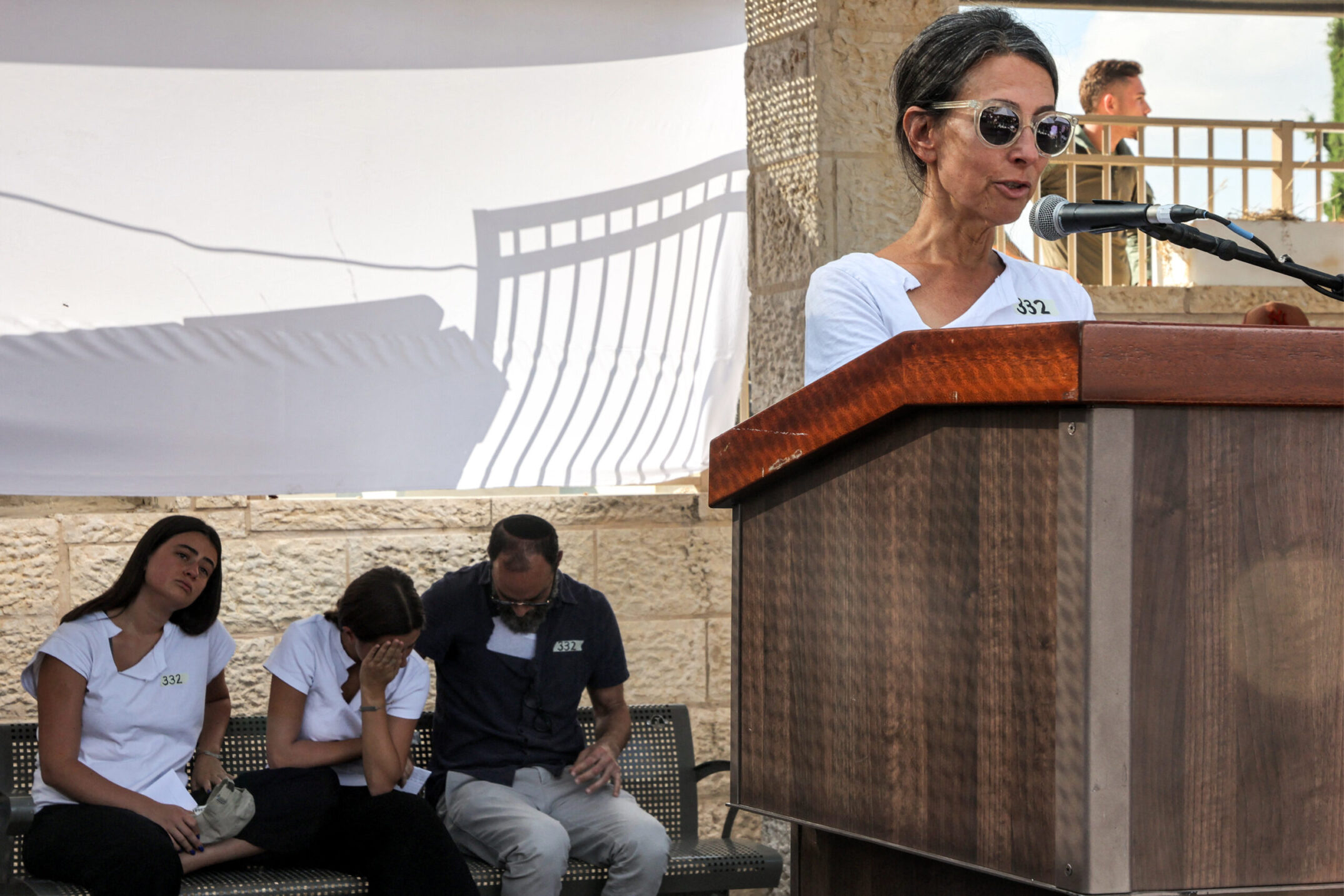
Rachel Goldberg, mother of killed U.S.-Israeli hostage Hersh Goldberg-Polin whose body was recovered with five other hostages in Gaza, speaks during his funeral in Jerusalem, Sept. 2, 2024. (Gil Cohen-Magen/pool/AFP via Getty Images)
We published a number of essays by family and friends of Israelis taken hostage on Oct. 7 or who fell in the war. In “My son died on Oct. 7. This Tisha B’Av, I’m thinking about how our greatest threat comes from within,” Rabbi Doron Perez remembered Captain Daniel Perez, who fought in the defense of Kibbutz Nahal Oz, and warned about disagreements among Jews curdling into “deep hatred.” Orna and Eldad Adar, whose 24-year-old daughter Gili was murdered on Oct. 7, wrote in “Hamas murdered our daughter. This is what she’d tell American Jews right now,” about the joy and optimism for Israel’s future she brought into the world
Meg Keene spoke for the countless families who followed the plight of Hersh Goldberg-Polin, a young Israeli-American who was believed to be held captive in Gaza before his death was announced in August. In “From Rachel Goldberg-Polin, we all heard the piercing cry of Jewish motherhood,” Keene wrote about Hersh’s mom and her unwavering advocacy for her missing son and all the hostages.
“Zionism” under siege
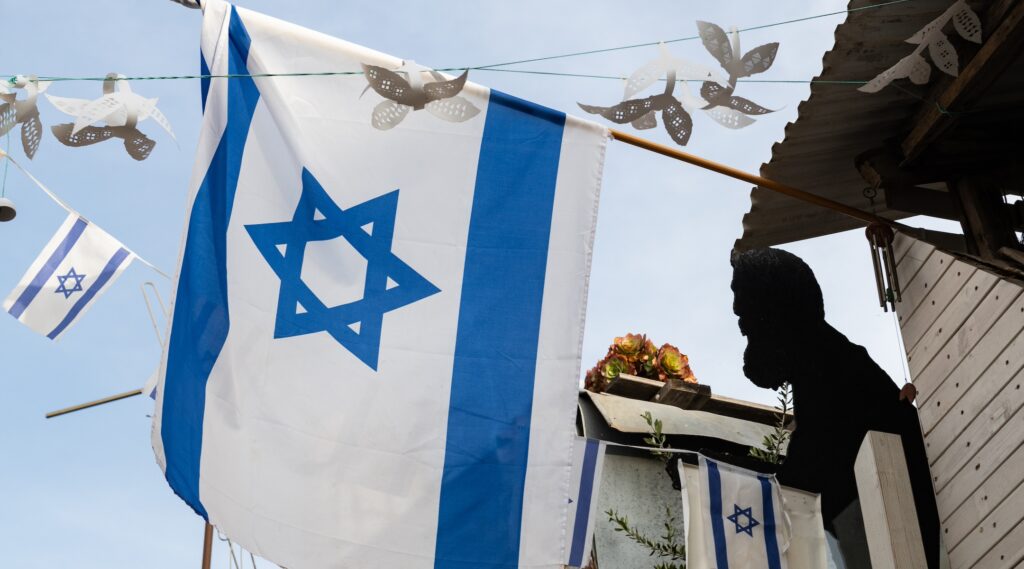
A silhouette of Theodor Herzl, the founder of modern Zionism, is displayed near a flag of the state of Israel on a building in Jerusalem. (Yehoshua Halevi/Getty Images)
With “Zionist” becoming a dirty word among campus protesters, we published articles talking about the word, the concept and their applicability today. Shira Li Bartov spoke to a number of Jewish scholars — including Derek Penslar, Gil Troy and Shaul Magid — about “What we talk about when we talk about ‘Zionism.’” In “For the sake of Israel, it’s time to retire the word ‘Zionism’,” Jewish studies scholars Alanna E. Cooper and Sharona Hoffman suggest that 76 years after the founding of Israel, “Zionism” has become an unhelpful term for those who believe in the country’s legitimacy and aspirations. In a response, “No, we shouldn’t retire the word ‘Zionism.’ We should take it back,” Zack Bodner argued that changing the Jewish vocabulary in response to their critics would be an act of capitulation.
The election and its discontents

Donald Trump speaks during a Republican presidential campaign rally at Riverfront Sports in Scranton, Pennsylvania, Oct. 9, 2024. (Michael M. Santiago/Getty Images)
The 2024 presidential election found Jews on both sides of the cantankerous political divide. Former Florida politician Peter Deutsch made “A Jewish and former Democratic congressman’s case for electing Donald Trump in 2024.” Veteran Jewish journalist Larry Yudelson, no fan of Trump, assailed his Jewish neighbors who voted for the former president, declaring “If Jewish unity means accepting bigotry and dehumanization, count me out.” Evie Blum, warning of tough times ahead, wrote of her resilience to political turmoil in “How Oct. 7 gave me the toughness I’ll need under a second Trump presidency.” And Rabbi Irwin Keller offered advice for healing on both sides in “How to disagree as Jews in a time of deep schisms.”
Jewish safety
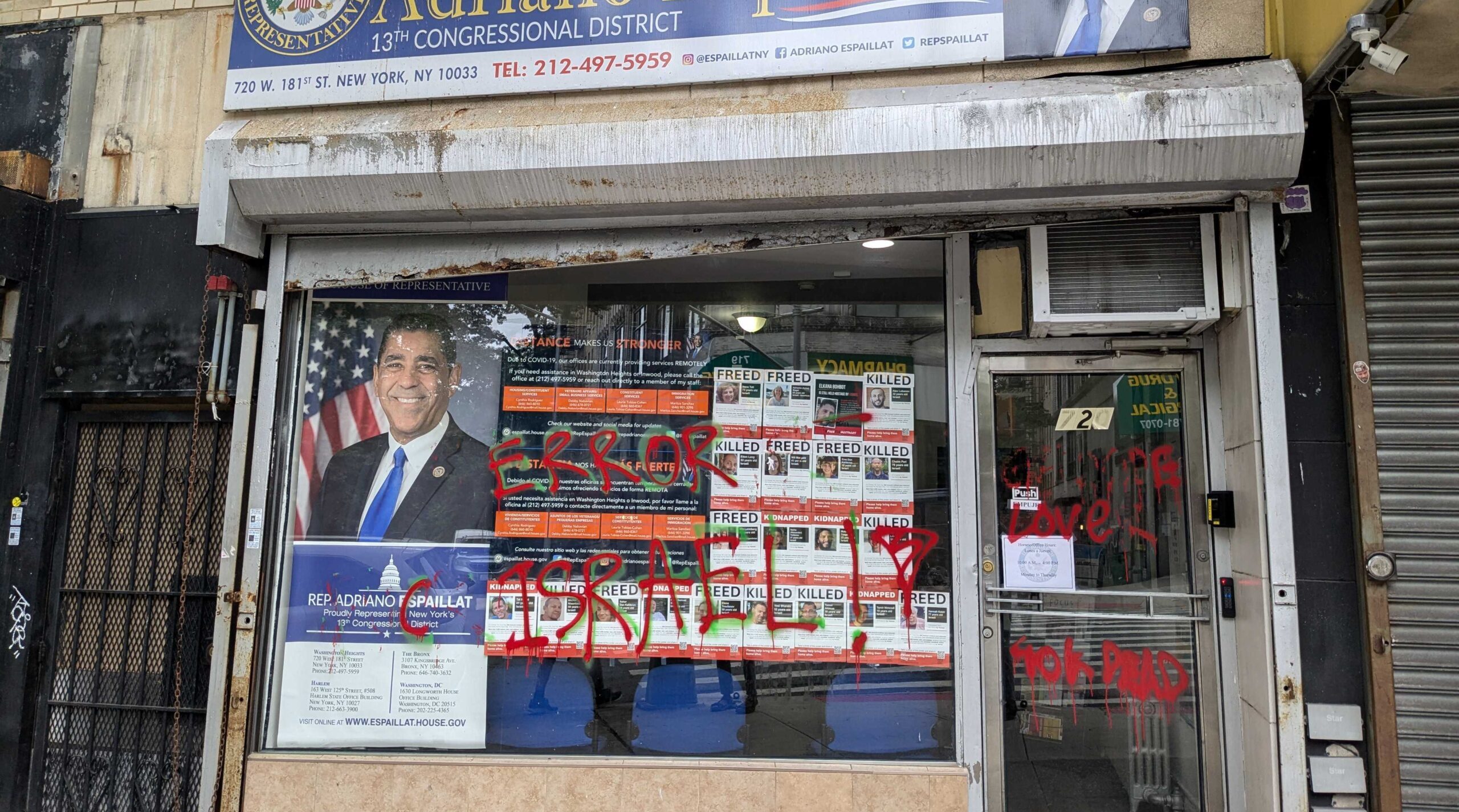
The Manhattan office of New York Rep. Adriano Espaillat vandalized with anti-Israel graffiti, Sept. 27, 2024. (Ben Sales)
Anti-Israel and antisemitic invective had many Jews questioning their own assumptions about feeling at home in America. “What Jews are feeling now is an inheritance of values — and trauma,” wrote Rabbi Dr. Tirza Firestone. Rabbi and Jewish studies scholar Vanessa Ochs, in “I used to cringe at Rosh Hashanah ‘blessings’ cursing our enemies. Not this year,” writes about the Jewish liturgical response to vengeance, and how to reconcile anger and forgiveness. In “I’m an NYC schools consultant. Here’s what I tell parents worried about antisemitism,” Alina Adams shared the advice she offers high school applicants after a string of incidents at New York City public and private schools. And Selma Spinner’s dilemma was captured in the title of her essay: “I grew up in Berlin, escaped terror in Israel and was called ‘disgusting Jew’ in New York. Where can I feel safe?”
History in the making
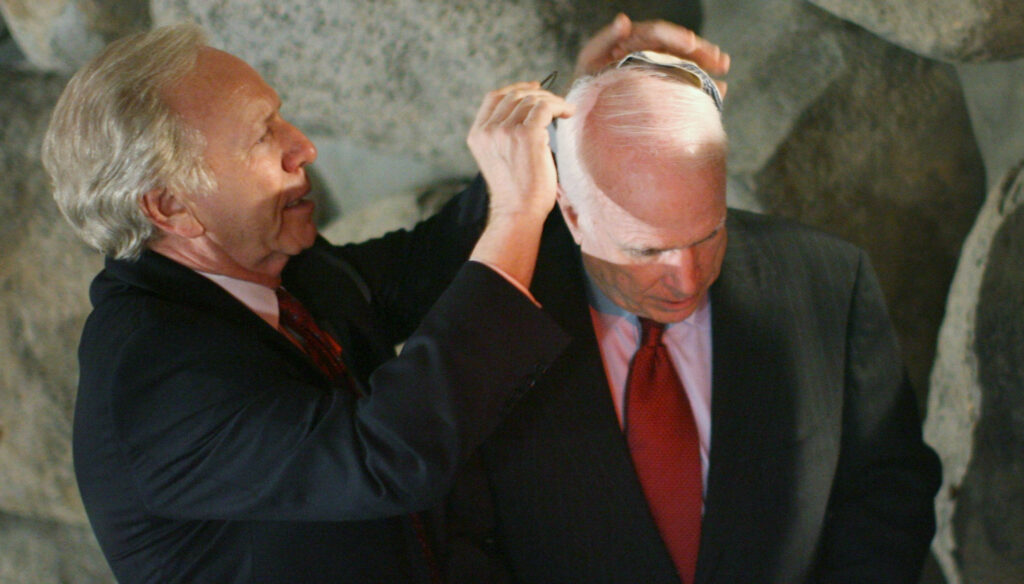
Sen. Joe Lieberman puts a kippah on the head of Arizona senator and presumptive Republican nominee John McCain during a visit to the Yad Vashem Holocaust Memorial in Jerusalem, March 18, 2008. (Uriel Sinai/Getty Images)
Beyond Oct. 7, Jews also reflected on other historical milestones both public and personal. Rabbi Ethan Tucker remembered the late Connecticut senator and vice presidential candidate Joseph Lieberman, who died suddenly in July. In “My stepfather Joe Lieberman set one path as a Jew in politics. Will his many successors follow it?” Tucker writes that Lieberman set out to “leverage his Judaism to accomplish things for others, for the broader world in which he lived.”
In “100 years after his death, Gen Z loves Franz Kafka. Now they ought to read him, too,” Kafka scholar Seth Rogoff noted that a social media craze for the enigmatic Czech Jewish writer risked turning a genius into a shallow meme.
And in a valedictory essay, JTA’s own longtime Washington correspondent Ron Kampeas wrote about the joys and dilemmas of covering Jewish politics. “To chronicle Jewish history is to be part of an ancient continuum,” Ron writes in “The blessing and burden of bearing first witness to Jewish history.” Despite the pain, despite the doubt, I have always chosen to bear witness. Now, as I step off the beat that has defined my career and into retirement, I am reassured that my colleagues will continue to make that choice, however difficult it may be at times.”
This article originally appeared on JTA.org.
















